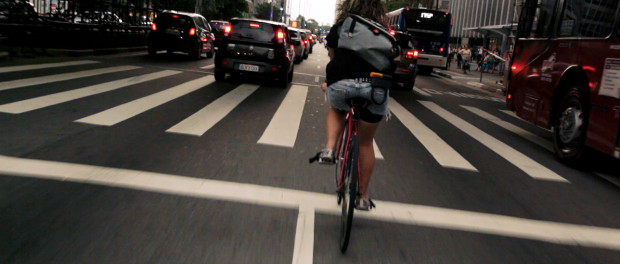Review of Bikes vs. Cars: Bike, or see the planet burn
Bikes vs. Cars is a reality-check film. While most environmentally aware people know that automobile pollution is one of the most deadly contributors to greenhouse emissions; that pollution and resulting environmental damage has skyrocketed over the past century; that the auto-revolution predominant in North America and slowly taking over the rest of the world continues to bleed into our planet by spewing various toxic gases and fumes into the atmosphere; this documentary takes you down to the basics.
Seen through the eyes of people who are passionate about mostly bikes and cars (somewhat), this film merely states the obvious. How cars are not our future, and biking – though on the face of it seems arduous, requires a bit of an effort, a change in mindset and yes, commitment to a different lifestyle – is where our technologies and innovation should be aimed at. And this does include the manufacturing of a next generation car that only continues to burn through fossil fuel.
The documentary begins in São Paolo, where the city of 20 million people boasts close to seven million registered cars. The average time in traffic every day is three hours, if not more. Our protagonist in the city is Aline Cavalcante. She moved to the ‘big’ city a few years ago. She committed to sticking with public transport in the beginning, but then gave up on it, for public transport is one of the most expensive modes of commuting (purposely made unaffordable, I reckon). She is scared of biking through the streets of Brazil’s largest city, where the distance between life and death can sometimes be a few inches. With biking just not being part of the culture of the city, Aline is a lone soldier who is frustrated about how one of the most sustainable forms of commuting is relegated to being an insignificant minority.
A few continents over, we have Copenhagen, which boasts an (officially) 40% bike ownership of all its daily commuters. Our friend Mr. Ivan Naurholm, a taxi driver, finds bikers and sharing the streets of the city with them as one of greatest annoyance. But biking is part of Copenhagen’s blood and is second nature to people. The city has over 1000 kilometres of bike lanes: truly a biker’s paradise!
Filmmaker Fredrik Gerten moves from Los Angeles to Berlin, from Thailand to Toronto, and the running theme of the film is the treacherous takeover of our daily lives by this engine-driven machine, which gives us traffic congestion, filthy air to breathe, and hours of life wasted in cooped up air-conditioned spaces.
One of the interviewees in the film speaks to the ‘dreamy idea’ of how the automobile became the bloodline of a nation. The idea that you could sit in your own little space and control how fast and how quickly you could get from one place to the other is today a totally lost idea. There is nothing fairytale-like in driving a car anymore.
What is unfortunate, and the film eludes to it a few times, is the monopolization of our commuting habits and needs by a well thought out plan, where car makers filled the pockets of rule makers and thus infiltrated each and every alleyway of our cities and towns with cars. The documentary reports that a few years ago the Merkel government in Germany killed an EU legislation to limit automobile emissions, simply because they got a huge donation from the car lobby, including the car giant Daimler.
With China looking to grow its car production to over 30 million cars a year, 1 cyclist is killed in Sao Paolo every week. In Los Angeles, 70% of public transport is dedicated to roads and parking, and more people ride bikes in Copenhagen than all of the United States. In places like Bogota, there is an impression that needs to be dismantled: that the poor ride bikes and the rich take to cars. If all of the above hasn’t convinced you to re-think your commuting habits, go watch Bikes vs. Cars.
Though the film is a fact sheet, for the most part, the important subject matter and attempted diversity of city spaces that it explores helps the film drive home the point of how we are destroying our planet by choosing to be behind the driver’s seat. The opening sequence of a bike pulling a burning planet earth towards the skies says it all.
The film is playing at Cinema du Parc until August 6th.







